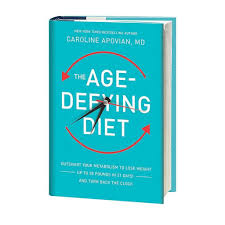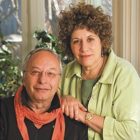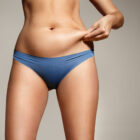
Outsmart Your Metabolism to Lose Weight
Dr. Mache Seibel: What made you want to write The Age-Defying Diet?
Dr. Caroline Apovian: Over the past 10-15 years I realize that most of my patients see me for their weight, for other nutritional issues. All the questions that they had for me had to do with turning back the clock or preventing the aging process that made them feel tired, overweight, fatigue, lack of energy, not feeling and looking their best; and so, I decided to write a book about it for everyone out there who don’t have a program to help this process.
[MS]: Women tell me all the time, “I’ve got a closet full of clothes that don’t fit, they’re a size too small,” or “I wake up tired. I really don’t have the energy. My ‘get up and go’ just got up and went.” You were talking about the fact that one of the big issues with aging is that people have a tendency to lose a lot of muscle. We may not look like we’re the body-builder type to begin with, but we do need muscles we are sitting on the floor and want to stand up, or pick up your children or grandchildren, or bring your groceries into the house. What happens to muscles with aging?
[CA]: As we get older, most people do less physical activity. Most sit down looking at the computer all day long, and aren’t doing what we used to do when we were in our 20s, for example, running around and maybe going to the gym. Suddenly we have a day full of doing other things.
[MS]: So, “Use them or lose them.”
[CA]: That’s right. Because, genetically, a long time ago, we needed our muscles to forage for food, look for shelter, and fend off animals; now, we’re getting into a society environment where we don’t need our muscles like we used to, and so, when we don’t have active physical activity, we start to lose our muscles. On top of that, as we hit menopause, also male menopause, we lose the hormones that maintained our muscle mass – estrogen and testosterone, and then you get this dramatic loss of both muscle and bone; the bone holds the muscles up. And so, all of this causes what we call sarcopenia (loss of muscle); sarcopenia isn’t entirely preventable, but a good percentage could be.
[MS]: You’re saying we don’t have as much muscle and bone because of aging and loss of estrogen and testosterone. And, we’re gaining weight; so you’ve got more weight to carry and less muscle and bone to move it. That’s a bad combination. Is that what you’re saying?
[CA]: That’s right. It becomes a vicious cycle. By the time many of us seek help for it, it has caused fatigue, lack of energy, depression, and all of the things that cause the vicious cycle to keep going. And there’s another aspect to this; the food that’s available to us has changed over the years. Now we have a lot of processed food that’s high in sugar and fat, and although most Americans seem to be getting enough protein, as we get older, we eat less protein.
[MS]: What are we eating?
[CA]: We’re eating a lot of fat and a lot of fat mixed with sugar, and less fruits and vegetables and lean protein.
[MS]: So our diets are not very well suited to sustain a long and healthy life or a body that will carry us. Our scaffolding isn’t supporting us.
[CA]: Exactly. And it’s not only obesity on the rise, so is type 2 diabetes, which leads to cognitive deficit and Alzheimer’s – something we all want to avoid.
[MS]: Alzheimer’s is referred to as type 3 diabetes because of the association between sugar levels and Alzheimer’s disease. Can you talk a little bit about what estrogen does to the metabolism in terms of aging and menopause?
[CA]: Yes. Estrogen is youth serum just like testosterone is. The loss of estrogen causes a redistribution of fat tissue in women. It moves from subcutaneous stores of the pear-shaped female with a small waist and larger hips into the abdominal or visceral compartment and that causes an increase in inflammation in arterioles and arteries so that we develop more heart disease, plaque formation, hypertension and type 2 diabetes. It also causes changes on our cholesterol to increased LDL and triglycerides and a lower HDL cholesterol, which is the good cholesterol.
[MS]: So, more of the bad stuff and less of the good stuff.
[CA]: Yes. Unfortunately, all those studies that showed estrogen, hormone replacement therapy, was detrimental to women, causing more stroke and heart disease.
[MS]: You’re referring to the fact that the original 2002 Women’s Health Initiative or WHI study showed that women who got estrogen plus the synthetic progesterone (Provera) had more heart disease, breast cancer and stroke than women who got a placebo. But they were mostly 60 to 79 years old, compared to women who got the placebo who were mostly 50 to 59.
Now we believe that a lot of it was because they already had heart disease, and the estrogen and progestin was amplifying an underlying problem that was there,
That’s a tragedy really, because I can still remember literally hundreds of my patients just taking their estrogen and throwing it out like a toxin.
[CA]: Mine too.
[MS]: And afraid that they were doing themselves harm, only to find out 15 years later almost that that isn’t necessarily the case.
[CA]: That’s right.
[MS]: Could you talk a little bit about estrogen and bones, and aging on bones?
[CA]: Estrogen has an effect on bone mineral and bone mass, so when you start to lose estrogen right at menopause, you have a very rapid loss in bone mass. That is when you really need to protect that bone as much as you can. It’s up to you and your doctor whether you want to go on HRT or not. Getting your vitamin D and calcium supplementation up to snuff and doing resistance exercise training can also protect your bone mass.
[MS]: If you go regularly and make a healthy habit, you can be healthier and it’s just part of your life. You just know you’re going to do that. And you’re not trying to think your only exercise is the remote. Exercise is good for you and it helps to counter a natural tendency towards weakness of muscle and weakness of bones,.
What are some things that they can do to help women keep their bones and muscle and control their fat?
[CA]: I hear women say, “I eat healthy, I’m walking, I’m trying to do as much exercise as I can, and even though I‘m eating my whole grains and my fruits and vegetables, I can’t seem to get this weight off.” So, the issue there is the process of sarcopenia has already started to occur, and so, the question is how can we counteract some of that sarcopenia?
In younger men and women, it requires counteracting that muscle loss by increasing your resting metabolic rate permanently.
[MS]: So you want to burn more calories when you’re sitting down doing nothing so that you don’t have as many to get rid of when you’re actively exercising.
[CA]: That’s right. When you are doing aerobic activity, you are increasing your metabolic rate. However, you go back to the same resting metabolic rate when you stop exercising. Your resting metabolic rate is directly related to how much muscle mass you have. As you get older, if a natural part of aging is losing muscle, your resting metabolic rate drops and you can’t eat the same number of calories that you did when you were younger.
[MS]: So, you burn more calories the more muscle you have; and you burn less calories, the more proportion of fat you have.
[CA]: That’s right.
[MS]: So, as you’re losing muscle, you’re burning fewer calories in an inactive state. What can you can do to help make more muscle, besides weight lifting or other things, resistance training as you talked about. What are some tips that people can use?
[CA]: Make sure when you are doing resistance exercise training, part of what happens is you injure the muscle, and in order for the muscle to be built and get stronger and bigger, you need to provide the building blocks to that muscle – amino acids that are found in good protein that contains all of amino acids. You find that in meat, fish, poultry, eggs, skim milk, cheese and dairy products, and yes some plant product as well, however it’s harder to get the complete amino acids in those plant products.
Soy is very good, yes; so soy milk, if you can’t drink regular milk and you don’t want to drink whole milk with the fat so you want to drink skim milk. In my book, I give you tips on how to get the protein to your muscles when they need it and this has been backed up by studies that have been done by researchers showing that a protein supplement before and after you work out can get the protein to your muscles when they need it.
[MS]: So if you just do a plank, which is an exercise where you lie on your side with your feet and your elbow on the ground and lift your hips up and hold it, you’re doing resistance. When I do those, a minute seems like forever. It doesn’t have to be running the Boston Marathon. And you’re saying that a little bit of a protein shake or some kind of a protein rich supplement is a good thing to have maybe before and after and your muscles are more receptive to incorporating that into them.
[CA]: That’s right. And those protein shakes as smoothies can be satiating so that they can serve as a meal replacement, if you need to lose weight. So, in addition to building back your muscle, you’re going to lose fat and you’re going to lose as little muscle with that fat as possible because you’re taking in that protein.
How much protein you need a day, is in my book, it’s also based on all of the studies that we did and we’ve come up with 1.5 grams per kilogram of body weight a day that you need. So, if you’re a 70-kilogram male or female, you need about 100 or so grams of protein.
[MS]: Well, if you figure there are 454 grams in a pound, 100 grams is about a quarter of a pound of protein; so you don’t need to have a great big rib-eye steak. A quarter of a pound of high quality of protein, is really all you need.
[CA]: People as they get older, especially women, lose their taste for protein especially animal protein, so it becomes a concern if you’re eating a lot of carbs and you’re not eating as much protein. That can be a problem because if you’re also trying to lose weight, you’re then going to lose muscle as well as fat. And as you’re losing bone because of your menopause, it could be this vicious cycle that I was talking about earlier. So that’s why it’s very important.
[MS]: I have a lot of patients who have had gastric bypass surgery. A lot of them have learned to cheat on and they end up getting their weight back. For those who have had some kind of a stomach operation, are there some nutrition tips that would be helpful for them to get the right kinds of foods?
[CA]: Yes. It depends on the procedure that they’ve had, but the most common operation is still the Roux-En-Y gastric bypass. You’re bypassing some of the intestine; you’re making the stomach a lot smaller than it used to be. Some of these patients have trouble with protein. They can have bread, they can have milkshakes, for example, but chewing and getting down steak and chicken and fish becomes problematic. They don’t have enough time for their gastric juices to digest it.
As they’re losing the weight, they are losing fat but they’re losing protein and they’re at risk for malnutrition, both because not enough protein being taken in, but also because of the vitamin and mineral deficiencies that could be problematic because you’re bypassing part of the intestine. For those patients, we highly recommend supplements, protein supplements that can go down easily without regurgitation, without nausea; then they’re getting their protein. So, a protein powder that you can mix with either skim milk or soy milk, frozen fruit to make it tasty, and then you could stick in your vegetables in there and you won’t even taste the kale that you put in there and it becomes a smoothie that’s appealing taste-wise, and also gives you the protein that you need.
[MS]: Those are some good pointers there. One other question that I have for you is the with aging, the stomach gets a little bit less acidic, and because of that, it doesn’t absorb calcium as well and a lot of people lose bone mass because they don’t absorb calcium. Are there any tips for absorption of calcium at a better rate?
[CA]: This is also true with our gastric bypass patients, same situation. So, we recommend to those patients taking calcium in the form of calcium citrate. First of all, that can be found over the counter; also, taking calcium on an empty stomach. And then this is also true not only of calcium but iron. If you take iron, you want to make sure that you take in iron that’s more highly absorbed, and that’s iron combined with vitamin C.
[MS]: Is vitamin C making the stomach more acid, or is it doing something else?
[CA]: The vitamin C somehow improves the absorption of the iron.
[MS]: Her latest book is called The Age-Defying Diet: Outsmart Your Metabolism to Lose
Dr. Caroline Apovian is Professor of Medicine and Pediatrics, in the Section of Endocrinology, Diabetes and Nutrition, at Boston University School of Medicine. She is also Director of the Center for Nutrition and Weight Management at Boston Medical Center and a national and international authority on obesity, weight control, nutrition. Her latest book is called The Age-Defying Diet – Outsmart Your Metabolism To Lose Weight.
You can follow her on Dr. Apovian on Facebook or on the web at www.drapovian.com




